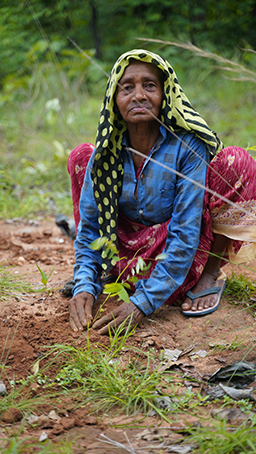
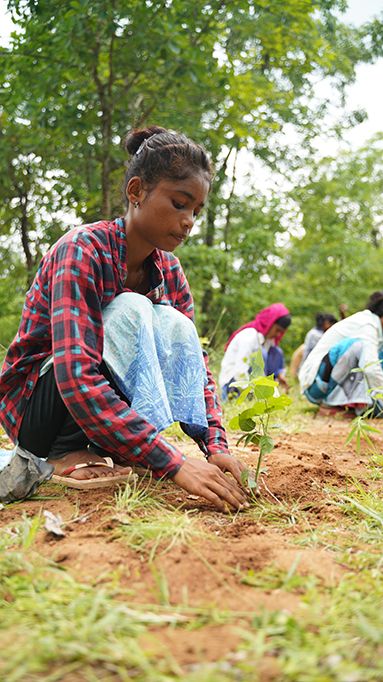

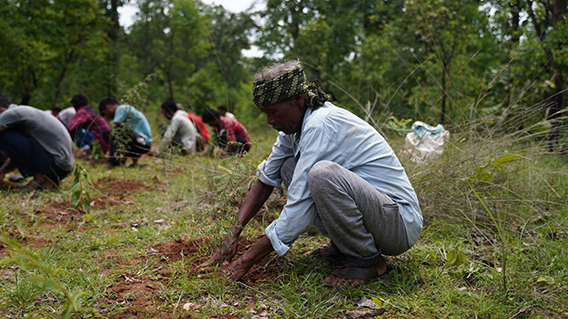
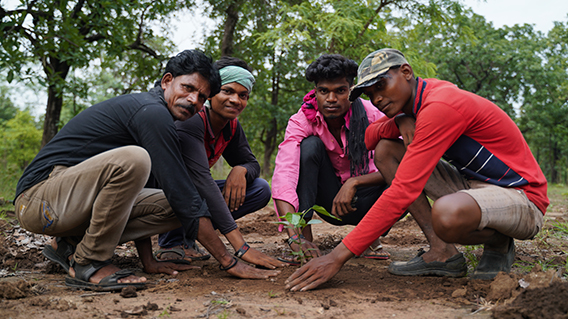

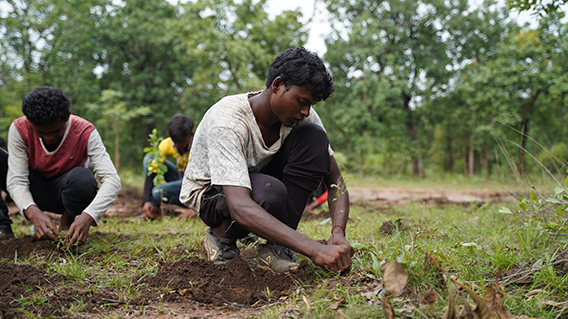


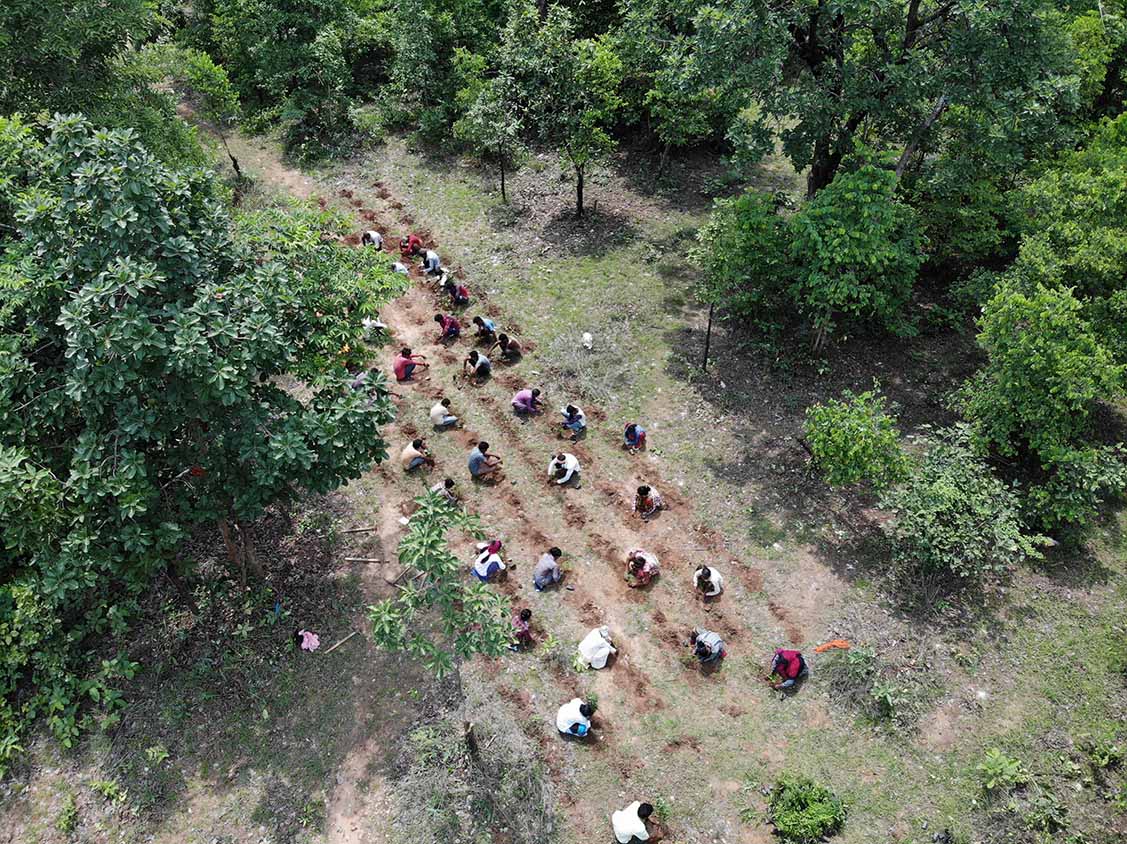
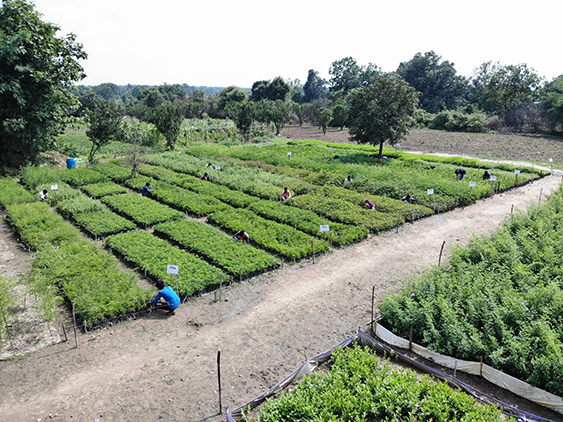
Project Target
0% Remaining
641,000
Trees Planted out of 641,000 Trees

Project Location:
Plantation of local tree species on the Wildlife corridor between Kanha National Park, Madhya Pradesh and Pench National Park, Maharashtra, India
Project Aim
The Pench corridor in Nagpur, Maharashtra, is one of the most important forest corridors in India. The corridors are pathways that allow tigers to move freely between various forest patches; this helps to maintain genetic diversity and ensure the long-term survival of these magnificent beasts. However, passing through these corridors is no easy feat - tigers have to navigate through hostile forest dwellers and poachers. Moreover, human activities such as the construction of roads and railways have made it even more difficult for the wildlife in Pench to thrive.
To support the survival of the Tigers, Grow-Trees has developed the Trees for Tigers® project. The project seeks to maintain the corridors as they are a vital lifeline for the tigers. Planting of trees not only makes it easier for tigers to move about freely but also brings about other benefits for the tigers. For instance, trees attract prey - as prey returns to the area, so do the predators.
Our plantation projects also consider the importance of maintaining conservation and community welfare. First of all, the planting site will serve as a buffer to mitigate human-animal conflict. Second - forest communities often depend on forest resources for their livelihood. Our project not only generates work for the local members but also allows them access to the forest produce to help them with their income.
An article in Mongabay that emphasizes the importance of corridors states, “India is home to almost 3000 tigers, comprising 60% of the global population. These tigers are isolated in their native ranges (mostly protected areas) and separated from other tiger populations due to habitat loss in the intervening regions.” It is crucial that we develop and maintain wildlife corridors linking tigers in different areas to maintain genetic diversity.
Independent wildlife photographer and World Press Photo winner 2022, Senthil Kumaran, has highlighted the impact of forest degradation on the tiger population. In an interview with Outlook India, he says, “The impact of deforestation of Indian forest over the last 100 years is now showing in the 21st century. In order to save their livelihood, both animals and people have started to fight with each other for their survival.” He further states, “The tiger’s population has doubled in the last 10 years. At the same time, forests have also seen a lot of destruction. Checking deforestation and finding a way to increase the forest landscape can be a way to reach a solution.”
By carefully selecting the types of trees we plant at our planting sites, we are able to provide a range of benefits to the environment and the community, while also ensuring that our efforts align with the specific needs of the location.
In this plantation site, we planted Amla (Emblica officinalis), Shisham/Sissoo (Dalbergia sissoo), Teak/Sagwan (Tectona grandis), Amrood/Guava (Psidium guajava), Earleaf Acacia (Acacia auriculiformis). Amla and Guava trees provide fruit that is popular in the communities. Teak and Sheesham trees provide superior-quality timber that can be a lucrative source of income. Additionally, the Acacia trees are used commonly for fuelwood; its wood is also commonly used to make pulp for the paper industry.
Planting of trees offers numerous benefits that span across multiple aspects.*
Generating Employment
Our project generates employment opportunities for the local communities since we are committed to working closely with them. They are involved in preparing the saplings in the nursery, transportation of the saplings, and plantation and maintenance of the planting site.
The local communities can also earn additional income from the plantation produce, in this case, they can supplement their income from timber and fruits once the tree matures.
Employment for Women
Tree plantation activities provide employment for women as many women workers participate in our projects.
Fodder for Livestock
Livestock is a major source of sustenance for the local community. Trees will provide ample fodder to meet the needs of their livestock.
Recharge Groundwater
Through planting of trees, we can help regulate the natural water cycle and improve water quality. This will benefit the locals.
Groundwater recharge happens when water from rainfall and other sources soaks into the ground and refills underground water sources. This is important in making sure we have enough water for drinking and other uses.
Facilitate the creation of a Tiger Corridor
Trees can help create corridors that connect forest patches and reduce habitat fragmentation. This corridor allows for the movement of tigers and other wildlife too.
Reduce Human-Wildlife Conflict
Since the plantation helps the sustenance of the local communities; they can collect fodder, fuelwood and fruits from the plantation site. A marked reduction in human-wildlife conflict can be expected.
Improve Soil Quality
Trees help to reduce soil erosion and improve the overall soil quality. This helps in improving the yield of forest produce. This in turn benefits the forest communities.
Carbon sequestration
Trees do an excellent job absorbing carbon dioxide from the atmosphere. A mature tree can absorb up to 20 kg of CO2 each year. Trees keep the temperature cool and reduce atmospheric stressors.
*The environmental benefits of the trees reach their full potential as they mature.
Social Impact of Growing Trees
Community Engagement
Tree planting initiatives often involve local communities, which can lead to greater community cohesion.
Ecological Education
Provides opportunities for community members, especially children, about the importance of environmental sustainability.
Urban Beautification
Trees contribute to the aesthetic enhancement of urban areas, making cities more pleasant and liveable.
Climate Resilience
By improving green cover, tree planting helps make communities more resilient against climate impacts like heatwaves.
Employment Creation
Planting trees creates employment for local community members like planting and maintenance, administrative roles, and more long-term jobs in management.
Wildlife Habitat
Trees provide critical habitats for various species of wildlife. Enhancing tree cover helps preserve biodiversity, which can be an ecological boon for local communities
Copyrights @ 2025 All rights reserved by Pangea EcoNetAssets Pvt Ltd.